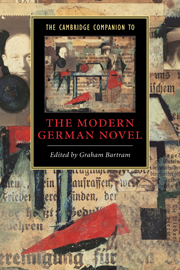Book contents
- Frontmatter
- 1 The German novel in the long twentieth century
- 2 Contexts of the novel
- 3 The novel in Wilhelmine Germany
- 4 Gender anxiety and the shaping of the self in some modernist writers
- 5 Franz Kafka
- 6 Modernism and the Bildungsroman
- 7 Apocalypse and utopia in the Austrian novel of the 1930s
- 8 Images of the city
- 9 Women writers in the ‘Golden’ Twenties
- 10 The First World War and its aftermath in the German novel
- 11 The German novel during the Third Reich
- 12 History, memory, fiction after the Second World War
- 13 Aesthetics and resistance
- 14 The kleiner Mann and modern times
- 15 The ‘critical’ novel in the GDR
- 16 Identity and authenticity in Swiss and Austrian novels of the postwar era
- 17 Subjectivity and women’s writing of the 1970s and early 1980s
- 18 The postmodern German novel
- Index
- Series List
18 - The postmodern German novel
Published online by Cambridge University Press: 28 May 2006
- Frontmatter
- 1 The German novel in the long twentieth century
- 2 Contexts of the novel
- 3 The novel in Wilhelmine Germany
- 4 Gender anxiety and the shaping of the self in some modernist writers
- 5 Franz Kafka
- 6 Modernism and the Bildungsroman
- 7 Apocalypse and utopia in the Austrian novel of the 1930s
- 8 Images of the city
- 9 Women writers in the ‘Golden’ Twenties
- 10 The First World War and its aftermath in the German novel
- 11 The German novel during the Third Reich
- 12 History, memory, fiction after the Second World War
- 13 Aesthetics and resistance
- 14 The kleiner Mann and modern times
- 15 The ‘critical’ novel in the GDR
- 16 Identity and authenticity in Swiss and Austrian novels of the postwar era
- 17 Subjectivity and women’s writing of the 1970s and early 1980s
- 18 The postmodern German novel
- Index
- Series List
Summary
In his study of the mechanics of scientific revolutions, Thomas Kuhn demonstrated that scientific researchers operate at any given time within a widely accepted paradigm, which determines the prevailing theories until the moment when a consensual crisis causes the old paradigm to be discarded in favour of a new one. In the humanities, paradigm shifts do not take place with such revolutionary abruptness, with such definitive breaks as in the sciences. Here the prevalent paradigms are more difficult to identify; one finds a codominance of older, renewed and new schools of thought that operate alongside, together with, or against one another.
Despite this, one particular paradigm has nevertheless attained clear pre-eminence in discussions of cultural theory during the past decades: that of the postmodern. Arising out of sporadic attacks during the 1960s against the conventions of modern literature and art, the postmodern debate has expanded into a general cultural critique and has affected practically all areas of the humanities.
- Type
- Chapter
- Information
- The Cambridge Companion to the Modern German Novel , pp. 266 - 279Publisher: Cambridge University PressPrint publication year: 2004

